Feb 26, 2025
As part of our work in Fairfield around air quality, community members have asked about ways to create more walkable spaces. Some of this work has to be done through large changes, such as the ideas envisioned by our Youth Air Protectors in their street redesign projects. But other changes can be done on a smaller scale, such as planting trees in front yards that will shade sidewalks and improve the air, as was done through two Fairfield garden installations through this program. Then there is what can be done on a community scale. We are excited that this spring we will be coordinating with the city, the community and Fairfield artist Sheree Rayford to create a community mural along Linear Park Trail. We hope this mural will invite residents to use, enjoy and care for the trail more often. We thank Sheree for sharing her blog, below, on this project and process.
By Sheree Rayford, creative artist
A couple of weeks ago, we put out a call for feedback on what the new Fairfield mural should represent. The responses were truly inspiring, painting a beautiful picture of what Fairfield represents. Every word, phrase, and flower submitted reflects the heart of our city and the values that make it feel like home.
Words That Shined Through
These words highlight what people cherish about Fairfield — a place where people care for one another, where kindness and connection thrive, and where there’s always room for growth and possibility.

The Most Loved Phrases:
- All are welcome here
- A diverse community that cares for all
- Unity in diversity
- Where dreams take flight
- Forever United… Forever Strong!
- El sol sale para todos / The sun rises for everyone
Each of these phrases speaks to the heart of Fairfield — a place of belonging, resilience, and shared dreams.
The Flowers of Fairfield & Their Meaning
The community also shared floral symbols that reflect Fairfield’s spirit:
- California Poppy – Resilience and renewal, much like our ever-growing city.
- Sunflower – Warmth, unity, and perseverance, always turning toward the light.
- Daisy – Fresh beginnings and joy, celebrating the vibrancy of our home.
- Mustard Flower – Strength in numbers, just like our strong community bonds.
- Marigold – Gratitude and perseverance, honoring the past while moving forward.
- Forget-Me-Nots – Connection and community, ensuring everyone has a place.
- Dahlia – Diversity and strength, reflecting Fairfield’s unique and beautiful mix of people.
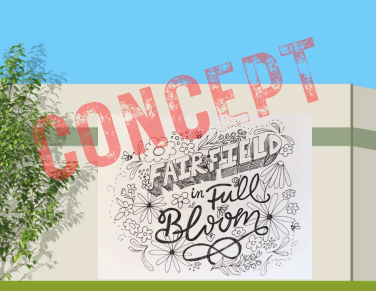 The Process: From Ideas to Sketches
The Process: From Ideas to Sketches
Taking that inspiration, I sketched up three rough design concepts that reflect these ideas. After sharing them with our partners at the city and getting approval from the building owner, we are moving forward with a design that embodies the idea of Fairfield’s potential blooming in full color.
Why This Mural Matters
Public art does so much more than just make a space look pretty (though, let’s be real, it’s about to be stunning). Studies show that murals:
- Improve walkability, making people more likely to explore and engage with their community.
- Reduce crime, creating safer, more inviting public spaces.
- Boost local pride and identity, giving residents a deeper connection to their city.
This project is all about that — bringing color, joy, and a sense of belonging to our city, and I can’t wait for all of us to see it come to life together.
March 22: Community Mural Collaboration and Celebration
Mark your calendars because on March 22, we’re throwing a community celebration like no other! This mural isn’t just for Fairfield — it’s by Fairfield, and I want as many of you as possible to be a part of it. We’ll be inviting everyone out to add some final personal touches, making sure this piece is something we can all see ourselves in. More details are coming soon, but just know — it’s going to be beautiful.
Register to be part of the community mural event here
 This mural project and Sustainable Solano’s Fairfield air quality work is part of California Climate Investments, a statewide initiative that puts billions of Cap-and-Trade dollars to work reducing greenhouse gas emissions, strengthening the economy, and improving public health and the environment — particularly in disadvantaged communities.
This mural project and Sustainable Solano’s Fairfield air quality work is part of California Climate Investments, a statewide initiative that puts billions of Cap-and-Trade dollars to work reducing greenhouse gas emissions, strengthening the economy, and improving public health and the environment — particularly in disadvantaged communities.
Apr 28, 2023
By Alex Lunine, Resilient Communities Program Manager
Growing up on a fairly quiet street, my summers were filled with wiffleball and basketball in the middle of the road. It’s no surprise that as we have become more and more dependent on our cars and shifted further towards virtual work, we have lost some of our connection between our community and nature. Concrete maintains a stranglehold on our streets and yards, while increasingly blistering summers and poor air quality limit our freedom to access our city’s amenities and outdoors. What we need is a drastic change to what we, as a community, prioritize in our public spaces, and that starts with you.
Map of Fairfield Communities
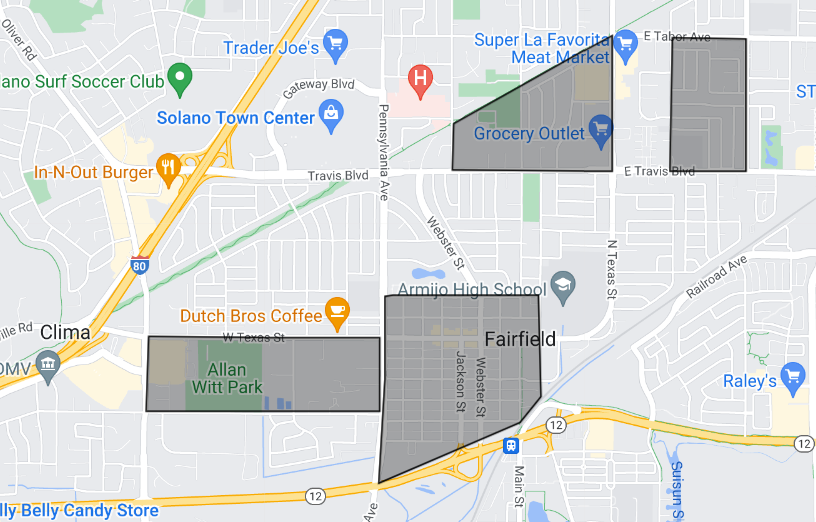
Sustainable Solano is looking to help grow an urban forest here in central Fairfield (see map above), where we have identified a lack of walkable infrastructure and a desperate need for tree canopy cover. By shading our yards, sidewalks, and streets with tree cover, we can mitigate the impacts of urban heat islands (making our 100+ degree summer days much more livable and reducing your energy costs), purify our polluted air, and make it more pleasant for our community to walk, bike and play outdoors more often.
SuSol has several programs that focus on creating green spaces within our cities, including waterwise, sustainable yards and community gardens that support neighborhoods through creating access to fresh garden produce. Through our programs, we seek to create resilient neighborhoods where neighbors can come together to create spaces that are abundant in habitat and tree cover and where neighbors can share resources. We’re inviting Fairfield residents, particularly those in the areas labeled in the map, to come together with their community around this type of project.
We can help support these efforts through our programs! If you want to transform and beautify your block with trees and greenery, please fill out this interest form so we can see if the site is a good fit for our programs. SuSol brings together community members in free educational workshops that are used to install these gardens, which are planned and led by a professional designer. There is a commitment from the property owner, but the programs help to fund these projects. If you’re interested for your yard or community, let us know, and please share this with your neighbors so we can grow beautiful, breathable, and walkable communities.
Nov 27, 2018
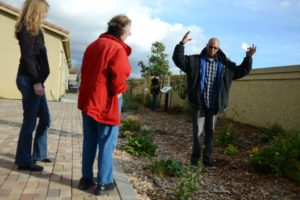 By: Susan Hiland (Daily Republic)
By: Susan Hiland (Daily Republic)
[Daily Republic Full Article]
Larry Lamoreux came out Saturday to see the sustainable garden at the former Mission Solano shelter. He is a member of the Sustainable Solano board and practices those principles at home in his backyard. “I just came out to keep an eye on what’s going on,” Lamoreux said. “It is such an encouraging project.”
Sustainable Solano offers practical ways of applying permaculture principles in your garden and community through its monthly “Walk the Talk” series, which takes place the last Saturday of the month at the shelter at 310 Beck Ave. Topics vary from sustainable landscaping to wise water use, soil building and other aspects of permaculture. These talks are free and open to the community, but registration is required.
Lamoreux said he is excited about the idea of swales, which take rainwater from the roof and run it to a ditch in the yard. The ditch is covered with mulch. “The mulch slowly allows for the water to be taken up by the plants,” he said. “This makes so much more sense than trying to use rain barrels because of the Mediterranean climate we live in.”
Swales save thousands of gallons of water from being wasted and puts it all into use, he said. Sustainable landscaper Jeffrey Barton talked Saturday about permaculture on a community scale and the impact of its principles on people, health and habitat.
The presentation illustrated how massive amounts of free food are being grown by community members on both private and public land, nourishing the surrounding community and serving as an educational lab for people interested in creating resiliency and living more sustainably.
The small gathering Saturday heard about food forest gardens, which can be fed by secondary water (a laundry-to-landscape greywater system or diverted roof water).
“We can create community spaces with food forests,” Barton said.
The former Mission Solano put in a food forest garden in December with a 1,300-square-foot space filled with fruiting trees and edible plants, something Barton helped see to fruition.
“Our culture treats rainwater like it is a nuisance in our society,” Barton said. But rainwater is a free source that can be captured and with a little bit of work made to work for the community in a food garden. “The work they are doing for a sustainable garden makes me hopeful,” Lamoreux said. “With the way we are treating the Earth . . . this is hope for our future.”
Dec 20, 2017
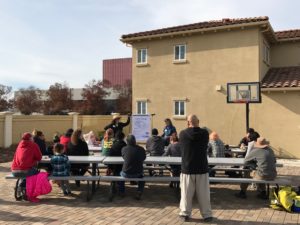
Sustainable Solano celebrates the official opening of its first public demonstration food forest garden in Fairfield at Mission Solano on Thursday, December 21st. The birth of this food-producing community garden was developed after Mission Solano’s Chief Operating Officer, Shauna Hughes, reached out to the only sustainability-based nonprofit in Solano county for a possible partnership in helping create better access to healthier, more nutritious food options for its resident guests, educational opportunities for job skills training and ways to encourage independent sustainable living practices for residents transitioning back into the community.
Sustainable Solano’s Sustainable Backyard Program’s late summer expansion into Fairfield this year began the conversation for the planning of a “Christmas” demonstration food forest garden that would serve the greater community and provide a source of inspiration to build neighborhood resilience across other Solano county neighborhoods.
Through numerous hands-on workshops, community members and Mission Solano residents worked hard this season planting trees and edible plants, digging swales and installing a laundry-to-landscape greywater system to create a beautiful, thriving edible landscape fed by secondary water (rainwater and greywater). This demonstration garden will be open most Saturdays of the year for self-guided tours and will provide educational opportunities for learning about growing food and using water wisely in the garden.
Anyone interested in attending this celebratory event from 2:00pm-3:00pm on Thursday, December 21st at Mission Solano (310 Beck Avenue, Fairfield) is welcome to come enjoy hot chocolate and sweet treats with neighbors in honor of this inspiring community effort to inspire and educate about how to grow locally and eat healthier. This project was made possible by funding from the Solano County Water Agency.
No registration is required.
The Sustainable Backyard program will expand to Suisun City next spring and to Vacaville in the fall of 2018. Sustainable Solano will be looking for both private and public lands to install food forests in these cities. Visit www.sustainablesolano.org and www.facebook.com/sustainablesolano for updates and details about this expansion.
Nov 29, 2017
By Rileigh Barton
Hi, I’m Rileigh, and I’m 13 years old. I volunteer for Sustainable Solano with my dad. I’ve gone to two Sustainable Landscaping classes so far at a food forest in Fairfield called “Mom’s Delight.” But first, I’ll tell you a little about me, and how I got involved in permaculture.
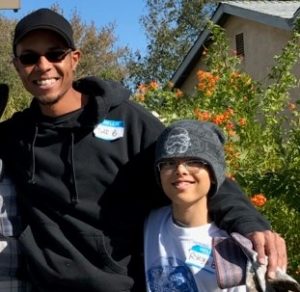
It all started at The Tomato Festival, Fairfield’s annual celebration of the tomato harvest, in August. My dad met Kathleen Huffman, Landscape Designer; and Nicole Newell, Program Manager at Sustainable Solano, and got involved with the program. Once he bought certified permaculture expert Denise Rushing’s book, “Tending the Soul’s Garden: Permaculture as a Way Forward Through Difficult Times“, Dad became fascinated with the idea of permaculture, which is short for permanent agriculture. Permaculture design is a way to work with nature to grow a resilient and edible eco-system. In September, Dad went to a Speaker Training class which kicked off my own interest in permaculture.
Two weeks ago on Saturday, Dad and I went to a Sustainable Landscape class, and witnessed the birth of a food forest. Kathleen talked to us about what we were going to be doing that day, and she taught us what swales were. Then the Food Forest Keeper, Brenda, came up front and told us about the forest. She’d nicknamed it “Mom’s Delight” because before she planted the garden in the backyard, her mom stayed inside all the time. Now her mom comes out and walks around and she’s happy. We then got to work. We first dug a swale, a ditch about 2 feet wide and 1 foot deep that is flat on the bottom. Then we filled it with mulch. There were lots of big dirt clods, and Kevin, a fellow volunteer, came in with a mattock to break up some of the clods. Before we planted the calamondin tree and the apple tree, Kathleen gave us a small lesson on how to plant trees and the best conditions for them. Then we planted the trees, mixing the natural soil with organic potting soil, and watered them.
A couple days ago, Dad and I went to another Sustainable Landscaping class. This time we were installing a Laundry-to-Landscape system, which saves time, saves water, and conserves energy. Christina and Nina from Greywater Action talked to us about these benefits and more, and oversaw the event. Up until lunch half of us worked inside while the other half worked outside. Dad and I worked on digging mulch basins, which are similar to swales, but often surround a single plant. Kevin and I took turns with the mattock to help with the digging. After lunch, we assembled and installed the Laundry-to-Landscape pipes. Then we worked together to irrigate the mulch basins. We didn’t quite finish, but Dad, Kathleen, and I came back the next day to finish.
This experience was one of the best things I’ve ever done. Permaculture is the only way to make Earth a healthier, and nicer, place to live. Definitely more people should participate in this, and I’m glad I got the chance to: “Save the world, one yard at a time!”
Nov 1, 2017
Sustainable Solano will be installing two demonstration food forest gardens in Fairfield at a private residence and one public location as part of its Sustainable Backyard program. The program aims to teach gardening techniques based on permaculture design principles (layered planting system that supports life) and wise water practices such as groundwater storage, roofwater catchment, and laundry-to-landscape greywater re-use. The expansion of these garden installation projects is funded by the Solano County Water Agency with the first project scheduled for 11/04, 11/11, and 12/16 at a private residential backyard.
This three-day installation will serve as a free, hands-on educational workshop open to Solano county residents. Attendees will have the opportunity to be a part of building the foundation for this garden by creating contour swales, building berms, planting fruit tree guilds and the installation of a laundry-to-landscape greywater system.
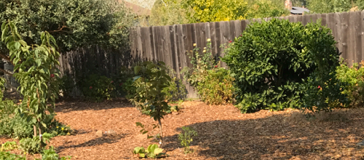
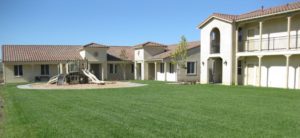
This holiday season, the program will also move forward with the creation of an edible “Christmas” food forest garden at Mission Solano, a transitional housing shelter that provides food, lodging, faith support and job training to over one hundred individuals and families in Solano County. Mission Solano sits on 3.5 acres with much of its land being underdeveloped making it an ideal location for a public demonstration food forest community garden. The demonstration garden will also include swales to capture rainwater, a laundry-to-landscape system, permaculture planting methods and will be open most Saturdays of the year for self-guided tours.
Mission Solano relies heavily on food donations and struggles with providing resident guests high-quality, nutritious food and access to fresh fruits and vegetables. A portion of food is purchased by the organization itself. Both partnering agencies saw an opportunity to not only reduce program food costs through this project, but to also serve the greater community by providing educational opportunities for Fairfield residents to learn about growing their own food, secondary water use and building resilient communities. On Saturday, 12/2 the public is welcome to attend a free greywater system installation workshop to learn how secondary water from your laundry and roof can feed an entire garden.
Most of the installation work and ongoing maintenance of this demo food forest garden will be completed by Mission Solano volunteers. The project is in in alignment with the agencies “job therapy” program that helps resident guests develop skills for future employment and sustainable living. Chief Operating Officer of Mission Solano, Shauna Hughes states, “By teaching our guests how to grow their own food, we can equip them to continue doing so once they establish permanent housing. This will help them overcome the barrier to good nutrition that most low-income residents face.”
Registration is required for all installation workshops for both public and private projects. Visit www.sustainablesolano.org/events to register.
The Sustainable Backyard program will expand to Suisun City next spring and to Vacaville in the fall of 2018. Sustainable Solano will be looking for both private and public lands to install food forests in these cities. Visit www.sustainablesolano.org and www.facebook.com/sustainablesolano for updates and details about this expansion.
About Sustainable Solano
Sustainable Solano a non-profit organization is a non-profit organization dedicated to Nurturing Initiatives for the Good of the Whole. For more information, email info@sustainablesolano.org or visit www.sustainablesolano.org.
 The Process: From Ideas to Sketches
The Process: From Ideas to Sketches This mural project and Sustainable Solano’s Fairfield air quality work is part of California Climate Investments, a statewide initiative that puts billions of Cap-and-Trade dollars to work reducing greenhouse gas emissions, strengthening the economy, and improving public health and the environment — particularly in disadvantaged communities.
This mural project and Sustainable Solano’s Fairfield air quality work is part of California Climate Investments, a statewide initiative that puts billions of Cap-and-Trade dollars to work reducing greenhouse gas emissions, strengthening the economy, and improving public health and the environment — particularly in disadvantaged communities.


 By: Susan Hiland (Daily Republic)
By: Susan Hiland (Daily Republic)



